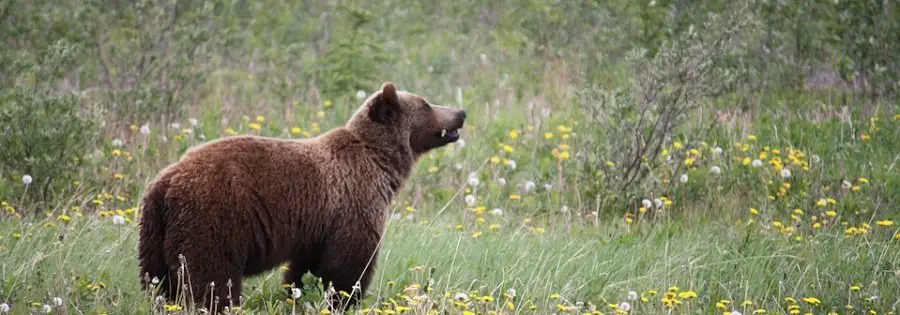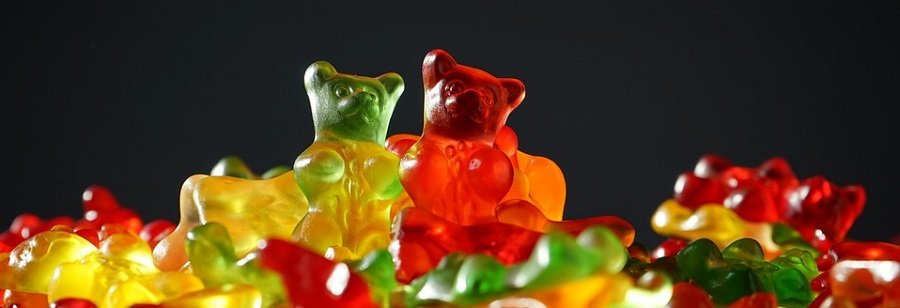
Anyone who has ever been camping in bear country knows that precautions are necessary to prevent animal encounters. Whenever you check in at a campground, you usually receive instructions about how to secure food to ensure bears are not attracted.
Food storage lockers are usually the best way to store food at a campground while hikers and backpackers can utilize bear canisters. Although there are many methods to keep food out of the reach of bears, you may not know which foods attract bears the most.
Some foods will have a much stronger effect on bears than others. While most human food can attract a bear, certain foods are more enticing and will be effective to lure bears to your campsite.
So what foods attract bears?
Here’s a list of foods that bears seem to be most attracted to.
- Bacon
- Sweets
- Fruits
- Grease
- Licorice
- Vanilla
- Fish
- Raw Meats
- Peanut Butter Fermented Food
- Onions and Garlic
- Cheese
- Coffe
- Pet Food
Clickable Table Of Contents
Most Attractive Foods to Bears
Like humans, bears rely on their sense of smell to know that food is in the area. They may not be able to see you cooking or unpacking foods, but they can smell odors from far away and be tempted to come to your campsite for a closer look.
Although some favorite human foods may not have a strong smell, the ones that will attract bears are usually those with a strong fragrance. The overpowering scent of food will reach a bear’s nose and they may be compelled to seek it out.
Some of the most delicious smelling foods to a bear include:
- Bacon
Most people find the smell of bacon frying to be intoxicating and bears are no different. It may be tempting to fry some bacon up on your campfire in the morning, but the smell can permeate a large space and linger for a long time.
- Sweets
The myth about bears loving sweet things exists for a reason. All kinds of fragrant sweets like pastries and donuts are a surefire way to attract a bear. Maple syrup is also a strong flavor that will get a bear’s attention. Anything with sugar, especially brown sugar, should be restricted to prevent bears.
- Fruits
In the wild, many bears love to forage for berries and other sweet, high-calorie foods. Similarly, having sweet fruits at your campsite will increase the chances of a bear stopping by to visit. Fruits like strawberries, raspberries, apples, oranges, mango, grapes, peaches, and more will definitely attract bears.
- Grease
The grease that drips from the grill when you barbecue and cook meat is strong-smelling and attractive to bears. Many hunters will use grease to spread near traps to lure bears into the area so they can be captured or killed.
- Licorice
For some reason, the smell of licorice seems to be particularly appealing for bears. Candies or licorice sticks that evoke the scent could attract bears, but other similar smells work too. Anise oil is a strong scent used by hunters to bait bears.
- Vanilla
The scent of vanilla extract is another smell that is also used to attract bears. Although it’s unlikely you will be baking or using pure vanilla while camping, it’s good to be aware of scents that might be a draw to bears. This includes using it in things like perfume, lotion, soaps, or shampoo.
- Fish
Anyone who works in an office knows that fish is one of the dishes best left at home. That’s because when cooked or reheated, it has a very strong smell. Likewise, cooking fresh fish on your campfire could attract a bear. They could also smell the scent when cleaning or gutting the fish. Tinned cans of tuna are also very fragrant and would probably attract bears.
- Raw Meat
If you bring steaks, burgers, or chicken to barbecue while camping, keep it stored securely so the scent won’t waft away from your campsite. Bears will be drawn to the smell of meat which may remind them of animal carcasses that, in their mind, are acceptable forms of food.
- Peanut Butter
With its distinctive smell, peanut butter is one of those foods which appeals to a wide variety of animals. Bears are no exception because they tend to like nuts which are a popular camping or hiking food when added to trail mix.
- Fermented Foods
While it’s unclear whether bears would actually eat fermented foods, the strong smell they give off would probably be enough to make them curious enough to learn more. Foods like sauerkraut and kimchi, in particular, have such an overpowering scent and should be left at home when going camping.
- Onions and Garlic
Cooking onions and garlic is a surefire way to get a potent food smell in the air. When cooking up these foods at home, the kitchen starts to smell incredibly delicious and tempting. Imagine how a bear would feel to have such scents drifting in the air away from your camp stove.
- Takeout Foods
Many delicious takeout foods are so mouth-wateringly delicious because of the hearty aromas they emit. Certain foods like Indian curries, Mexican dishes, and Chinese entrees are the worst offenders. They taste amazing but the smells are enough to make a bear want to dine on them too.
- Popcorn
The smell of fresh popcorn is a comforting aroma to many and it also has a very strong scent that tends to linger for a long time. Not to mention if the popcorn gets burnt, then the smell is especially pungent and can be difficult to disperse.
- Cheese
Many kinds of cheese have a very strong smell that is attractive to animals. Although some are not as strong as the infamous Limburger cheese, even the mildest ones can be detected by a bear’s sensitive nose. Cheesy foods such as grilled cheese or pizza may also work to attract a bear to your camping area.
- Coffee
Fresh coffee is a smell that many people love, even those who aren’t coffee drinkers. It has a very strong, robust aroma and could definitely attract bears. Although it may not be realistic to be expected to give up coffee when camping, you can take steps to keep the odor to a minimum.
- Pet Food
While most pet food is completely unappealing to humans, the same can’t be said for other animals, including bears. Dry kibble may not have as strong a smell as some canned foods, but it’s fragrant enough to be detected by bears from far away. Pet food should always be stored safe from a bear if you are camping with furry friends.

Non-Food Scents That Attract Bears
Reducing food smells and properly storing food is the primary way to prevent bears from coming to your camp and getting habituated to humans. However, there are other scents that could attract bears that have nothing to do with food.
Bears can get curious about new and unique smells that they want to learn more about. Although a smell might not point to a food source, they won’t know that until they investigate it for themselves.
Most of the scents humans bring with them camping come in the form of toiletries but can also extend to other personal care items and may include:
- Cosmetics
- Perfume or cologne
- Shaving cream
- Soap
- Shampoo
- Conditioner
- Hand sanitizer
- Wipes
- Deodorant
- Lotion
- Sunscreen
- Bug spray
- Chapstick
- Toothpaste
- Suntan lotion
- Dry shampoo
- Hair spray or gel
- Essential oils
- Face or body wash
- Makeup remover
- Medications
- Vitamins
- First aid items
- Cleaning supplies
If you bring any of these items along with you, make sure to seal them in a bag when they aren’t in use. Never store them in the tent even when it isn’t in use. Only take out the items you need when going to the bathroom to use them and put them away immediately after use.
Hunters often will try to control their scent by washing all their clothes in an unscented detergent and bathing with unscented soaps and shampoos. Although this might be an extreme measure, it is worth considering if you want to take additional steps to deter bears.
Laundry detergent and dryer sheets can have strong fragrances that might attract a bear to your clothing. You should always sleep in a clean pair of clothes that are different than the ones you cooked in so there are no smells lingering to attract a bear at night.
Other Tips to Deter Bears
- Proper Trash Disposal
Never burn trash because campfires rarely are hot enough to properly burn up food. Instead, put your trash into an airtight bag and dispose of it right away.
- Keep Your Campsite Clean
While trash disposal is important, so is keeping a clean campsite. This means cleaning your grill or barbecue after use and cleaning any crumbs or food debris. Wash cookware, eating utensils, bowls, and cups right away and store them securely. Wash up immediately after eating so smells do not linger nearby.
- Dispose of Leftovers
Don’t bury leftovers. Instead, throw them away or store them in an airtight container before placing them in a food storage locker or locked vehicle. Don’t leave food sitting out even if you plan to eat it later.
- Cook Far From Your Tent
Set up a kitchen and cooking area at least 100 yards from your tent. Never eat inside your tent or in your sleeping bag. Try to make the cooking area downwind from your tent and always dump dirty dishwater downwind and far from your eating area.
- Store All Foods Securely
Foods that are sealed in plastic can still attract a bear. Just because something is freeze-dried or in an unopened can doesn’t mean it isn’t a potential bear hazard. Even if the smell is not strong, bears can begin to recognize certain containers as food and try to bite into them.
- Choose a Boring Site
Pick a campsite that is boring to a bear and does not have any sources of food nearby such as berry bushes. Make sure bears do not frequent the area either. Look for bear tracks, scat, or claw marks on trees that mean bears could live nearby.
More Articles You Will Love
What Smells or Items Repel Bears? ( how to deter and not attract bears )
Bears Are Attracted To Human Feces and Urine ( Here’s how to stop it )

